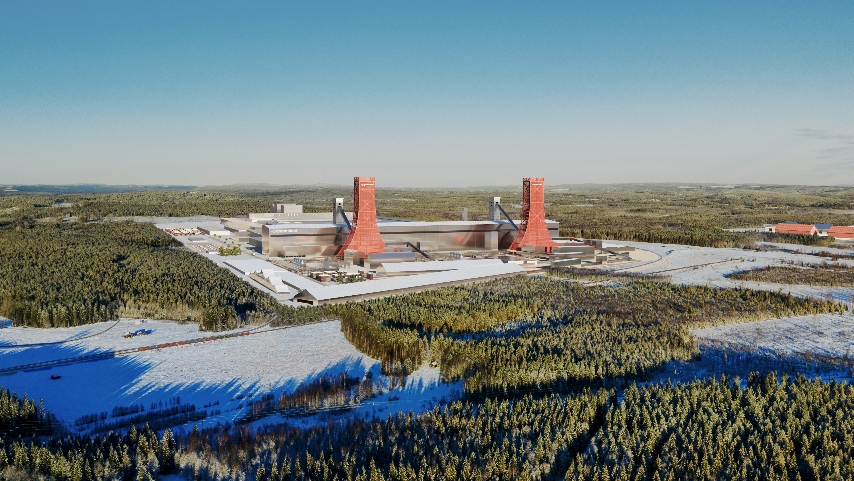By recognising H2 Green Steel as a Climate Solutions Company, the Exponential Roadmap Initiative, a partner of the UN-backed Race to Zero, validates the Swedish industrial start-up’s plan to deliver significant emissions reductions compared with traditional steel manufacturing.
This post was orginially published by H2 Green Steel and was adapted for cross-posting.
The Exponential Roadmap Initiative was launched to accelerate climate action and solutions through the exponential scaling of ground-breaking products, services and projects. H2 Green Steel is a living example of such a project as it was founded in 2020 to accelerate the decarbonization of the steel industry. By qualifying as a Climate Solutions Company, H2 Green Steel not only commits to the Exponential Roadmap Initiative’s strict overall criteria in the 1.5°C Business Playbook, but also fulfills additional criteria.
Established companies can set ambitious greenhouse gas reduction targets for their operations. For an industrial cleantech company building an operation from scratch, other targets are more relevant. The Exponential Roadmap Initiative presents a framework in which a cleantech company can screen and verify its ambition and ability to scale climate solutions – exponentially. To be considered a Climate Solutions Company, the candidate needs to bring an offer to the market that reduces emissions intensity by more than 50 percent compared to the prevailing technology. In the case of H2 Green Steel, that number is 95 percent.
“Our goals at H2 Green Steel are anchored in science. In times where greenwashing is a real problem, the Exponential Roadmap Initiative offers a route for serious cleantech companies to validate that their ambitions and plans are Paris-aligned. It’s in our DNA to accelerate change towards sustainable solutions and to scale them exponentially. It’s why the company was established. When we start operations in Boden at the end of 2025, no other steel maker will have as small an environmental footprint as we do, but we hope all the others will follow quickly,” says H2 Green Steel CEO Henrik Henriksson.
H2 Green Steel is building the world’s first large scale green steel plant. When H2 Green Steel’s plant in Boden begins operations the carbon intensity will be approximately 95 to 195 kg of CO2 per tonne of steel, depending on which steel product is being manufactured and including Scope 1 and 2 emissions, compared to about two tonnes of CO2 in blast furnace-based steel making.

H2 Green Steel’s plant in Boden will look like this when it starts operations in 2025. Image: H2 Green Steel
Starting its green steel operations at the end of 2025, H2 Green Steel beats the steel sector by some 15 years based on the current Science Based Targets initiative’s 1.5°C-aligned steel roadmap. By demonstrating that it’s possible, H2 Green Steel hopes that others will be pushed to speed up and follow suit.
However, to H2 Green Steel that is not enough. In addition to the immense abatement via the steel production, H2 Green Steel also commits to and fulfills other criteria including:
- A net-zero target for the Boden plant in 2040, including both its own emissions (Scope 1 and 2) and those of its suppliers (upstream Scope 3).
- A commitment to cut the carbon intensity of our products (Scope 1 and 2) in half by 2035.
- An exponential acceleration of its decarbonization impact, through establishment of new sites and by engaging in new industry verticals leveraging green hydrogen production in the years to come.
- Collaboration with organizations, including civil society, that are pushing the climate action agenda.
“We are delighted to welcome H2 Green Steel as a member in the Exponential Roadmap Initiative together with other world-leading companies. H2 Green Steel is a true climate solutions company because over 90 percent of its income is derived from a climate solution – a climate solution that reduces emissions by 95 percent compared to business as usual. This is exactly the kind of solution that needs to be scaled exponentially to shift out fossil-based solutions. We look forward to collaborating on removing remaining barriers and scaling solutions faster through radical collaboration,” says Johan Falk, CEO of the Exponential Roadmap Initiative.
H2 Green Steel’s plant in Boden, Sweden will be the first of its kind to combine production of green hydrogen, green iron, and green steel in a single flow, using renewable electricity throughout the production process. Europe’s largest electrolyzer will produce the hydrogen used in the direct reduction-reactor process. It is in the direct reduction step that the bulk of the emissions reduction is achieved. A hot sponge iron product is then processed through an electric arc furnace together with steel scrap to a homogenous melt of liquid steel then onward to continuous casting and rolling as well as fining.

